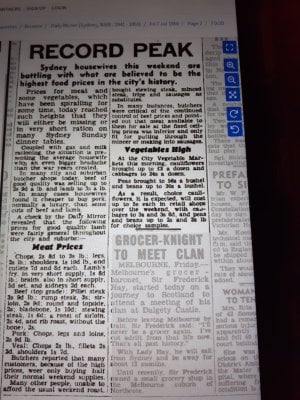Major retailers face possible breakups following price gouging allegations
By
Danielle F.
- Replies 51
With the cost of living constantly on the rise, consumers struggle to keep up with necessities.
In a bold move that could reshape the Australian grocery landscape, the Opposition proposed a plan that could see retail giants gone.
This controversial idea sparked a fiery debate nationwide, with shoppers, farmers, and politicians weighing in on the potential impact of such a drastic measure.
A coalition proposal to break up retail giants—Coles, Woolworths, and Bunnings—was raised should the Opposition win the next federal election.
According to Opposition Leader Peter Dutton, they would grant consumer watchdog the Australian Competition and Consumer Commission (ACCC) the power to enforce divestiture as a last resort to address anti-competitive behaviour by the major chains.
In extreme cases, the ACCC could force a supermarket to sell off parts of its business to increase market competition.
Dutton argued that this plan would not only protect customers at the checkout but also align Australia with similar powers in the United States of America and United Kingdom.
'The situation in Australia at the moment is that there's a massive concentration of market share within the two major companies, within Coles and Woolies,' Dutton said in an interview.
'There are many complaints, and validly made by consumers as well, who are worried about what it means when they go to the checkout with ever-increasing prices.'
As a safeguard, Dutton assured that measures would be put in place to prevent job losses.
For the powers to be applied, a court would have to find that divestment would result in a substantial improvement in competition and should be of public interest.
However, the Albanese Government dismissed the proposal, with Prime Minister Anthony Albanese likening it to a 'Soviet-style solution'.
Instead, the government planned to implement a mandatory Code of Conduct for how supermarkets treat suppliers, with hefty fines reaching $10 million for breaches.
Treasurer Jim Chalmers criticised the Opposition's proposal as a 'half-baked idea'.
'When it looked at this matter, it said that the risk was that it could actually make things worse, not better,' he stated.
'It found that forced divestiture resulted in a supermarket selling some of its stores to another large incumbent, or in forced closure of stores.'
The Greens, on the other hand, welcomed the push for divestiture powers.
Greens Leader Adam Bandt urged the Government to recognise the financial strain consumers are facing.
Nationals Leader David Littleproud also echoed the same sentiment, citing the disparity between the prices farmers receive for their produce and what consumers pay at checkout.
Despite these arguments, Assistant Competition Minister Andrew Leigh stated that attempts to break up the supermarkets do not make sense.
'This is a power which is rarely used in other countries. We are focused on getting measures which will benefit Australian households,' Leigh argued.
The debate over supermarket pricing and market power is not new.
In a previous article, a Greens-led inquiry into supermarket pricing previously recommended breaking up the supermarket duopoly to prevent market abuse.
The inquiry recommended amending the Competition and Consumer Act 2010 to make price gouging an offence.
However, a separate review by former Labor minister Craig Emerson advised against such a move, warning of reduced competition and job losses.

What are your thoughts on this issue? Have you felt the impact of rising prices at the checkout? Share your experiences and opinions with us in the comments section below.
In a bold move that could reshape the Australian grocery landscape, the Opposition proposed a plan that could see retail giants gone.
This controversial idea sparked a fiery debate nationwide, with shoppers, farmers, and politicians weighing in on the potential impact of such a drastic measure.
A coalition proposal to break up retail giants—Coles, Woolworths, and Bunnings—was raised should the Opposition win the next federal election.
According to Opposition Leader Peter Dutton, they would grant consumer watchdog the Australian Competition and Consumer Commission (ACCC) the power to enforce divestiture as a last resort to address anti-competitive behaviour by the major chains.
In extreme cases, the ACCC could force a supermarket to sell off parts of its business to increase market competition.
Dutton argued that this plan would not only protect customers at the checkout but also align Australia with similar powers in the United States of America and United Kingdom.
'The situation in Australia at the moment is that there's a massive concentration of market share within the two major companies, within Coles and Woolies,' Dutton said in an interview.
'There are many complaints, and validly made by consumers as well, who are worried about what it means when they go to the checkout with ever-increasing prices.'
As a safeguard, Dutton assured that measures would be put in place to prevent job losses.
For the powers to be applied, a court would have to find that divestment would result in a substantial improvement in competition and should be of public interest.
However, the Albanese Government dismissed the proposal, with Prime Minister Anthony Albanese likening it to a 'Soviet-style solution'.
Instead, the government planned to implement a mandatory Code of Conduct for how supermarkets treat suppliers, with hefty fines reaching $10 million for breaches.
Treasurer Jim Chalmers criticised the Opposition's proposal as a 'half-baked idea'.
'When it looked at this matter, it said that the risk was that it could actually make things worse, not better,' he stated.
'It found that forced divestiture resulted in a supermarket selling some of its stores to another large incumbent, or in forced closure of stores.'
The Greens, on the other hand, welcomed the push for divestiture powers.
Greens Leader Adam Bandt urged the Government to recognise the financial strain consumers are facing.
Nationals Leader David Littleproud also echoed the same sentiment, citing the disparity between the prices farmers receive for their produce and what consumers pay at checkout.
Despite these arguments, Assistant Competition Minister Andrew Leigh stated that attempts to break up the supermarkets do not make sense.
'This is a power which is rarely used in other countries. We are focused on getting measures which will benefit Australian households,' Leigh argued.
The debate over supermarket pricing and market power is not new.
In a previous article, a Greens-led inquiry into supermarket pricing previously recommended breaking up the supermarket duopoly to prevent market abuse.
The inquiry recommended amending the Competition and Consumer Act 2010 to make price gouging an offence.
However, a separate review by former Labor minister Craig Emerson advised against such a move, warning of reduced competition and job losses.
Key Takeaways
- Opposition Leader Peter Dutton proposed using divestiture powers to address anti-competitive behaviour by major supermarket chains, should they win the next federal election.
- The Albanese Government opposed the 'Soviet-style' plan and instead focused on imposing a mandatory code of conduct for supermarkets.
- The Opposition's proposal aimed to help small businesses and farmers, but some experts feared divestiture could lead to less competition and job losses.
- A Greens-led inquiry supported the idea of breaking up the supermarket duopoly to prevent market share abuse. The Nationals also called for action as both farmers and consumers face price discrepancies.









